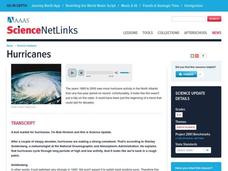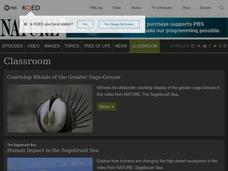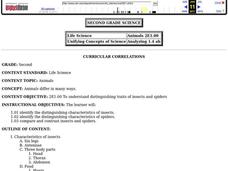American Museum of Natural History
What's This? Colorful Creatures
An online resource shows learners some species that are very good at using their camouflage as well as other ways species use their coloring for survival. Interactive and digital, the lesson is perfect as a remote learning resource.
Curated OER
Sandscapes to Landscapes
Students explore landscapes and create their own in a creative project.
Curated OER
Shake, Rattle and Roll
Students explore how to locate the location of an earthquake and why earthquakes happen more frequently in some areas more than others.
Curated OER
A Honey of a Hexagon
Students explore how bees make honey and why the hexagon is the best basic pattern for the honeycomb through the use of a video and hands-on activities with honeycombs and geometric shapes.
Curated OER
Weather Patterns
Students research to determine weather patterns and natural hazards most likely to affect their region.
Curated OER
Multiplying Microbes
Ninth graders investigate the techniques of culturing bacteria. They culture bacteria using agar plates. Students identify and describe some environmental conditions that effect bacteria growth.
Curated OER
Once in a Blue Moon
Third graders identify the phases of the moon. They use technology to access websites on the Internet dealing with the moon.
Curated OER
Natural Resources and Transportation in the United States
Students study thematic maps (included with the lesson) to determine possible relationships. They develop three hypotheses about the relationship. Students choose one of their hypotheses to explain. The explanation is to include reasons...
Curated OER
Hurricanes
Students listen to a transcript of an interview about an upswing in hurricanes with Stanley Goldenberg, a researcher with the National Oceanographic and Atmospheric Administration. students participate in a series of discussion questions.
Curated OER
Plotting Plates
Students investigate plate tectonics and their correlation with natural phenomena like earthquakes and volcanoes. They use the internet to see real-time data about earthquakes and volcanoes. Students plot latitude and longitude points on...
Curated OER
Earthworm Movement and Landscape Structure
Students describe differences in animal usage of habitats depending upon successional status of site. They also design other experiments to test movement patterns of animals through habitats of differing structure.
Curated OER
Make-Your-Own Math Practice
Students create their own math practice book. In these homemade book lessons, students create their own counting, number, and shape pages. When the pages are complete, they are bound together in a book.
Curated OER
The Meaning of Genetic Variation
Students investigate variation in the beta globin gene by identifying base changes that do and do not alter function, and by using several Internet-based resources to consider the significance in different environments of the base...
Curated OER
Water, Water Everywhere
Studetns view a terrarium with water droplets on the wals. They discuss the ways the water could have got onto the wall of the terrarium. Students design an experiment to duplicate the process. They describe the patterns form their data...
Curated OER
Tessellations
Students identify and construct figures that tessellate. They investigate which regular polygons tessellate and how to modify them to make other tessellating figures. Students explore how naturally occurring tessellations have been...
Curated OER
Proportionality: Modeling the Future
Young scholars explore and examine how patterns, measurement, ratios and proportions are utilized in the research development and production of airplanes. They meet a pilot from the Federal Aviation Association who describes the growth...
Curated OER
Characteristics of Snakes and Turtles
Students examine the characteristics of snakes and turtles and compare/contrast reptiles with mammals. They watch a video, answer discussion questions, complete information charts, conduct Internet research, and create a habitat diorama.
Curated OER
Descriptive Paragraphs
Third graders gain the necessary skills to write a descriptive paragraph. They see the evaluation and decision making process that are used in good wriitng. The bible is used to see illustrations and then used to paint a picture in...
Curated OER
Water & Ice
Students investigate the properties of water. For this states of water lesson, students explore how water goes from liquid to solid and back to liquid again. Students use measurement, observation, and communication to describe the change.
Curated OER
Animals
Second graders explore the ways in which animals differ. They discuss the characteristics of insects and spiders. Students identify the characteristics of insects and spiders. They compare and contrast insects and spiders.
Curated OER
Laetoli Trackway Puzzle
Students try to reach a "best explanation" after viewing diagrams. In this trackway instructional activity students complete several worksheets, make observations and hypothesize.
Curated OER
"For The Birds" [part II]
Students examine how Chinese and Japanese artists used different kinds of birds
as representations of ideas that were important in both cultures and create their own birds using the technique of origami.
Curated OER
"For the Birds" [part I]
Young scholars identify birds that appear in Chinese and Japanese art, learning about
their physical characteristics, classifying them according to scientific principles, and exploring their habitats and migration patterns. This is part...
Curated OER
Urban Impact on Chollas Creek (California): A Field Study
Students, in groups, take samples from a creek and keep a field journal on their samples. They also perform tests on their samples.























!["For The Birds" [part II] Lesson Plan "For The Birds" [part II] Lesson Plan](http://content.lessonplanet.com/resources/thumbnails/122476/large/cgrmlwnvbnzlcnqymdeymtaxny0yoda5lwu0ew85zi5qcgc.jpg?1414222640)
!["For the Birds" [part I] Lesson Plan "For the Birds" [part I] Lesson Plan](http://content.lessonplanet.com/resources/thumbnails/122462/large/cgrmlwnvbnzlcnqymdeymtaxny0ynji5lwd4n2h5by5qcgc.jpg?1414222903)
